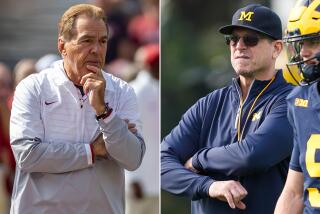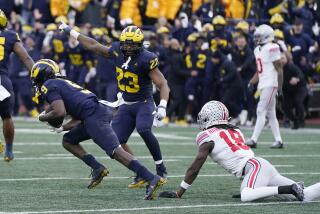Leadership Sorely Lacking in the Midst of Tragedy
- Share via
During this week of crisis, college football was exposed for what it is: an ambiguous, amorphous, rudderless ship. There was no commissioner of college football to step in at a time when it desperately needed one.
Say what you will about baseball’s Bud Selig and the NFL’s Paul Tagliabue, but they are undisputed CEOs of their companies. Both had the power and the mandate this week to postpone play in their leagues and that’s exactly what they did.
College football is a sport of individual fiefdoms, mainly the six major conferences: Pacific 10, Big Ten, Big East, Atlantic Coast, Big 12 and Southeastern. What we saw this week was individual college leaders running in different directions-not to the betterment of their sport.
Where was the National Collegiate Athletic Assn. on all this? It was toothless in the debate, with neither the power nor resolve to speak with a collective voice.
You hear from the NCAA from time to time on matters of crimes and misdemeanors. For example, the University of Utah basketball program is facing minor sanctions for secondary violations that include Coach Rick Majerus giving his players milk and cookies during a film session.
But when terror struck, and other sporting leaders convened to act and react, the NCAA stepped to the fore and released this statement: “Conference and individual schools have authority to determine whether to play regular-season games.”
This was technically true, but more could have been said. NCAA President Cedric Dempsey might have added, “while we cannot dictate policy in this matter, the NCAA strongly advises that football play on all levels be suspended this week in wake of this terrible news.”
With no command-central leadership, colleges and universities took off on their own, many switching field and back-pedaling faster than any cornerback on scholarship.
Here’s a report card on how the major conferences reacted:
* A: Big East and Atlantic Coast.
There was no waffling. Both conferences announced Wednesday that games would not be played. Period, end of story.
Big East Commissioner Michael Tranghese, on the right side of most issues, sensed the larger picture and acted accordingly. This tragedy hit close to home in the Big East, which has members in or around New York, Boston, and Pittsburgh. “There is increased sensitivity in the league,” Tranghese said.
ACC Commissioner John Swofford also recognized the ramifications. In Maryland and Virginia, he represents schools close enough to the Pentagon to give pause about matters of football.
* B: Pac-10.
Its heart was in the right place. Commissioner Tom Hansen fought from the start to speak with unanimity. Hansen wanted all games to be postponed. His intuition told him to tread delicately.
“I tried to convince the others that as the week goes on I think emotions will mount,” Hansen said Wednesday. “Right now we’ve got this airport situation, we’ve got a manhunt going on. I think when the totals are released on the number of dead, it’s going to be devastating.”
About his players, Hansen added: “We need to keep them close and our arms around them right now and give comfort to them.”
Unfortunately, two Pac-10 schools, Oregon State and Washington State, did not postpone their home games until they took barometric readings of the political winds.
Oregon State and Washington State had extenuating issues, namely the difficulty in rescheduling home games they desperately needed to balance their financial sheets. Still, it would have been nice if the Pac-10 could have acted as one.
* C: Big 12.
It basically played follow the leader, most of its members not acting until the NFL called off its weekend schedule. The conference had originally planned to play all games, but that changed when kingpin Nebraska broke ranks and announced it would not play host to Rice in a Saturday game.
* D: Big Ten.
It gets our pass-the-buck award. The Big Ten announced decisions would be left to individual schools, then became outraged when the Associated Press reported Thursday the Big Ten had postponed or deferred all weekend play. A Big Ten spokesman issued a terse response, saying the Big Ten had not postponed play, even though it was clear at that point all 11 of its schools would not be playing.
The Big Ten got hung up on semantics, insisting it had not technically postponed anything and that all decisions were made independently by its members. And, of all the major conference commissioners, no one was more conspicuously low profile this week than Jim Delaney.
* F: Southeastern.
One day, the great bastion of southern football conferences was staring down terrorism, with its commissioner, Roy Kramer, vowing to play on in the face of adversity. To prove it was resilient, the SEC was going to write a $1-million check to aid in disaster relief.
Football on southern soil, though, was going to be played. “We are not sitting back,” Kramer insisted. “We are going to make this a very meaningful Saturday for all of our people as well as for the victims and we feel this is the appropriate expression of that sentiment.”
Then, of course, the SEC did sit back. In fact, it tilted to full recline. After the NFL postponed weekend play, SEC presidents stepped in and reconsidered the wisdom of playing games of trivial pursuits.
It was reported that a staff worker in the University of Tennessee offices was driven to tears because of calls from irate fans deploring the school’s decision to play Florida at Gainesville, Fla. The SEC finally backed off, even though it was clear Kramer still wanted to play.
“We can’t sit in our living rooms and watch television 24 hours a day,” Kramer told the Atlanta Journal-Constitution.
The SEC would have been better served by taking a measured approach. There was no reason to be jingoistic before the full measure of events could be calculated.
The SEC should have said it was monitoring events and would make a decision about Saturday games at the appropriate time.
More to Read
Go beyond the scoreboard
Get the latest on L.A.'s teams in the daily Sports Report newsletter.
You may occasionally receive promotional content from the Los Angeles Times.











